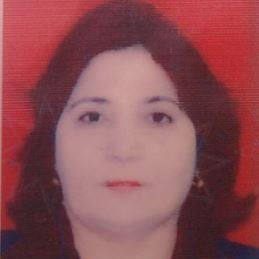
Aybeniz S. Aliyeva
Work place: Institute of Information Technology of ANAS, City, AZ1141, Azerbaijan
E-mail: aliyeva.a.s@mail.ru
Website: https://orcid.org/0000-0002-1739-1808
Research Interests: Computational Learning Theory, Data Structures and Algorithms, Data Structures
Biography
Aybeniz S. Aliyeva graduated from Applied Mathematics faculty of Baku State University. After graduating from university she began working Institute of Information Technology of ANAS. At the moment she is a senior researcher at the Institute of Information Technology. Her research interests include Electron demography, Big Data, Big Data Analytics and machine learning. She is the author of more than 60 papers. More than 20 of her works were published in international journals and conferences.
Author Articles
Development of a Prediction Model on Demographic Indicators based on Machine Learning Methods: Azerbaijan Example
By Makrufa Sh. Hajirahimova Aybeniz S. Aliyeva
DOI: https://doi.org/10.5815/ijeme.2023.02.01, Pub. Date: 8 Apr. 2023
The accuracy of population forecasts is one of the most important calculations in demography statistics. However, traditional demographic methods used in population projections are tend to produce biased results. The need for accurate prediction of future behavior in a number of areas require the application of reliable and efficient methods. Recently, machine learning (ML) models have emerged as a serious competitor to classical statistical models in the forecasting community. In this study, the performance and capacity of the four different ML models such as Random forest (RF), Decision tree (DT), Linear regression (LR) and K-nearest neighbors (KNN) to the prediction of population has been examined. The aim of the study is to find the best performing regression model among these machine learning algorithms for forecasting of population. The data were collected from the State Statistical Committee of the Republic of Azerbaijan website were used for the analysis. We used five metrics such as mean absolute percentage error (MAPE), mean absolute error (MAE), root mean squared error (RMSE), mean square error (MSE) and R-squared to compare the predictive ability of the models. As the result of the analysis, it has been known that the all ML models showed high results with correlation coefficient of 0.985 - 0.996. Also the KNN and RF prediction models showed the lowest root mean square deviation, means square error and mean absolute error values compared to other models. By effectively using the advantage of the ML algorithms, the forecast of population growth the near future can be observed objectively, and it can provide an objective reference to the strategic planning in the public and private sectors, particularly in education, health and social areas.
[...] Read more.Analyzing the Impact of Vaccination on COVID-19 Confirmed Cases and Deaths in Azerbaijan Using Machine Learning Algorithm
By Makrufa Sh. Hajirahimova Aybeniz S. Aliyeva
DOI: https://doi.org/10.5815/ijeme.2022.01.01, Pub. Date: 8 Feb. 2022
For almost two years, the world has been battling a global trouble- the COVID-19 pandemic. The disease, which has spread to about 225 countries around the world, has devastated the healthcare system of even the most developed countries. Governments have found the only way out is to impose a strict quarantine regime and state of emergency. Scientists immediately began testing the vaccine. Vaccination would still be the only savior of the planet's inhabitants.Because many of these pandemic infections have exactly been prevented thanks to vaccines in the past. Although the reduction in the number of infections after strict quarantine measures allowed the restrictions to be eased, the next wave was starting soon. This made it necessary the preparation of the vaccine as soon as possible. At the end of last year, the expected news came. Thus, in December 2020, the vaccination process has been launched in a number of countries. Azerbaijan is also one of the first countries to join the vaccination. The vaccination process, which began on January 18, 2021 continues, provided that 4 types of vaccines are available to the population. As a result of vaccination, the epidemiological situation in Azerbaijan is under control, as in many countries. In this article has been attempted to find a correlation between vaccination and COVID-19-confirmed cases and deaths. For this purpose, the k-means cluster-based machine learning method has been used in the Azerbaijan data collection obtained from the GitHub repository of the Center for Systems Science and Engineering at Johns Hopkins University. This research can benefit governments, stakeholders, and relevant institutions in the health care sector in monitor the vaccination process and more detally assess the epidemiological situation , and make important decisions to control and manage the spread of the disease.
[...] Read more.Other Articles
Subscribe to receive issue release notifications and newsletters from MECS Press journals